Business
Best business and leadership books of 2018
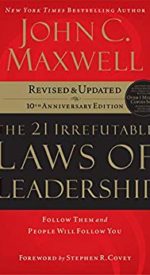
The 21 Irrefutable Laws of Leadership: Follow Them and People Will Follow You
If you’ve never read The 21 Irrefutable Laws of Leadership, you’ve been missing out on one of the best-selling leadership books of all time. If you have read the original version, then you’ll love this new expanded and updated one.
Internationally recognized leadership expert, speaker, and author John C. Maxwell has taken this million-seller and made it even better:
Every Law of Leadership has been sharpened and updated
Seventeen new leadership stories are included
Two new Laws of Leadership are introduced
New evaluation tool will reveal your leadership strengths—and weaknesses
New application exercises in every chapter will help you grow
Why would Dr. Maxwell make changes to his best-selling book?
“A book is a conversation between the author and reader,” says Maxwell. “It’s been ten years since I wrote The 21 Laws of Leadership. I’ve grown a lot since then. I’ve taught these laws in dozens of countries around the world. This new edition gives me the opportunity to share what I’ve learned.”
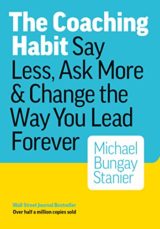
The Coaching Habit: Say Less, Ask More & Change the Way You Lead Forever
In Michael Bungay Stanier’s The Coaching Habit, coaching becomes a regular, informal part of your day so managers and their teams can work less hard and have more impact.
Drawing on years of experience training more than 10,000 busy managers from around the globe in practical, everyday coaching skills, Bungay Stanier reveals how to unlock your peoples’ potential. He unpacks seven essential coaching questions to demonstrate how–by saying less and asking more–you can develop coaching methods that produce great results.
– Get straight to the point in any conversation with The Kickstart Question
– Stay on track during any interaction with The Awe Question
– Save hours of time for yourself with The Lazy Question
– and hours of time for others with The Strategic Question
– Get to the heart of any interpersonal or external challenge with The Focus Question
– and The Foundation Question
– Ensure others find your coaching as beneficial as you do with The Learning Question
A fresh innovative take on the traditional how-to manual, the book combines insider information with research based in neuroscience and behavioural economics, together with interactive training tools to turn practical advice into practiced habits. Witty and conversational, The Coaching Habit takes your work–and your workplace–from good to great.

Factfulness: Ten Reasons We’re Wrong About the World–and Why Things Are Better Than You Think
Factfulness: The stress-reducing habit of only carrying opinions for which you have strong supporting facts.
When asked simple questions about global trends—what percentage of the world’s population live in poverty; why the world’s population is increasing; how many girls finish school—we systematically get the answers wrong. So wrong that a chimpanzee choosing answers at random will consistently outguess teachers, journalists, Nobel laureates, and investment bankers.
In Factfulness, Professor of International Health and global TED phenomenon Hans Rosling, together with his two long-time collaborators, Anna and Ola, offers a radical new explanation of why this happens. They reveal the ten instincts that distort our perspective—from our tendency to divide the world into two camps (usually some version of us and them) to the way we consume media (where fear rules) to how we perceive progress (believing that most things are getting worse).
Our problem is that we don’t know what we don’t know, and even our guesses are informed by unconscious and predictable biases.
It turns out that the world, for all its imperfections, is in a much better state than we might think. That doesn’t mean there aren’t real concerns. But when we worry about everything all the time instead of embracing a worldview based on facts, we can lose our ability to focus on the things that threaten us most.
Inspiring and revelatory, filled with lively anecdotes and moving stories, Factfulness is an urgent and essential book that will change the way you see the world and empower you to respond to the crises and opportunities of the future.
—
“This book is my last battle in my life-long mission to fight devastating ignorance…Previously I armed myself with huge data sets, eye-opening software, an energetic learning style and a Swedish bayonet for sword-swallowing. It wasn’t enough. But I hope this book will be.” Hans Rosling, February 2017.
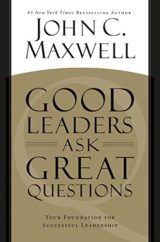
Good Leaders Ask Great Questions: Your Foundation for Successful Leadership
John Maxwell, America’s #1 leadership authority, has mastered the art of asking questions, using them to learn and grow, connect with people, challenge himself, improve his team, and develop better ideas. Questions have literally changed Maxwell’s life. In GOOD LEADERS ASK GREAT QUESTIONS, he shows how they can change yours, teaching why questions are so important, what questions you should ask yourself as a leader, and what questions you should be asking your team.
Maxwell also opened the floodgates and invited people from around the world to ask him any leadership question. He answers seventy of them–the best of the best–including . . .
What are the top skills required to lead people through difficult times?
How do I get started in leadership?
How do I motivate an unmotivated person?
How can I succeed working under poor leadership?
When is the right time for a successful leader to move on to a new position?
How do you move people into your inner circle?
No matter whether you are a seasoned leader at the top of your game or a newcomer wanting to take the first steps into leadership, this book will change the way you look at questions and improve your leadership life.

This Is Marketing: You Can’t Be Seen Until You Learn to See
NEW YORK TIMES BESTSELLER! A game-changing approach to marketing, sales, and advertising.
Seth Godin has taught and inspired millions of entrepreneurs, marketers, leaders, and fans from all walks of life, via his blog, online courses, lectures, and bestselling books. He is the inventor of countless ideas that have made their way into mainstream business language, from Permission Marketing to Purple Cow to Tribes to The Dip.
Now, for the first time, Godin offers the core of his marketing wisdom in one compact, accessible, timeless package. This is Marketing shows you how to do work you’re proud of, whether you’re a tech startup founder, a small business owner, or part of a large corporation.
Great marketers don’t use consumers to solve their company’s problem; they use marketing to solve other people’s problems. Their tactics rely on empathy, connection, and emotional labor instead of attention-stealing ads and spammy email funnels.
No matter what your product or service, this book will help you reframe how it’s presented to the world, in order to meaningfully connect with people who want it. Seth employs his signature blend of insight, observation, and memorable examples to teach you:
* How to build trust and permission with your target market.
* The art of positioning–deciding not only who it’s for, but who it’s not for.
* Why the best way to achieve your goals is to help others become who they want to be.
* Why the old approaches to advertising and branding no longer work.
* The surprising role of tension in any decision to buy (or not).
* How marketing is at its core about the stories we tell ourselves about our social status.
You can do work that matters for people who care. This book shows you the way.

The Laws of Human Nature
From the #1 New York Times-bestselling author of The 48 Laws of Power comes the definitive new book on decoding the behavior of the people around you
Robert Greene is a master guide for millions of readers, distilling ancient wisdom and philosophy into essential texts for seekers of power, understanding and mastery. Now he turns to the most important subject of all – understanding people’s drives and motivations, even when they are unconscious of them themselves.
We are social animals. Our very lives depend on our relationships with people. Knowing why people do what they do is the most important tool we can possess, without which our other talents can only take us so far. Drawing from the ideas and examples of Pericles, Queen Elizabeth I, Martin Luther King Jr, and many others, Greene teaches us how to detach ourselves from our own emotions and master self-control, how to develop the empathy that leads to insight, how to look behind people’s masks, and how to resist conformity to develop your singular sense of purpose. Whether at work, in relationships, or in shaping the world around you, The Laws of Human Nature offers brilliant tactics for success, self-improvement, and self-defense.

Ladies Who Punch: The Explosive Inside Story of “The View”
Like Fire & Fury, the gossipy real-life soap opera behind a serious show.
When Barbara Walters launched The View, network executives told her that hosting it would tarnish her reputation. Instead, within ten years, she’d revolutionized morning TV and made household names of her co-hosts: Joy Behar, Star Jones, Meredith Vieira and Elisabeth Hasselbeck. But the daily chatfest didn’t just comment on the news. It became the news. And the headlines barely scratched the surface.
Based on unprecedented access, including stunning interviews with nearly every host, award-winning journalist Ramin Setoodeh takes you backstage where the stars really spoke their minds. Here’s the full story of how Star, then Rosie, then Whoopi tried to take over the show, while Barbara struggled to maintain control of it all, a modern-day Lear with her media-savvy daughters. You’ll read about how so many co-hosts had a tough time fitting in, suffered humiliations at the table, then pushed themselves away, feeling betrayed—one nearly quitting during a commercial. Meanwhile, the director was being driven insane, especially by Rosie.
Setoodeh uncovers the truth about Star’s weight loss and wedding madness. Rosie’s feud with Trump. Whoopi’s toxic relationship with Rosie. Barbara’s difficulty stepping away. Plus, all the unseen hugs, snubs, tears—and one dead rodent.
Ladies Who Punch shows why The View can be mimicked and mocked, but it can never be matched.

My Morning Routine: How Successful People Start Every Day Inspired
ONE OF AMAZON’S BEST BUSINESS BOOKS OF 2018 SO FAR
ONE OF THE FINANCIAL TIMES BUSINESS BOOKS OF THE MONTH (MAY 2018)
ONE OF BUSINESS INSIDER’S BEST BUSINESS BOOKS TO READ THIS SUMMER
“A guide to the early morning habits that boost your productivity and relax you—featuring interviews with leaders like Arianna Huffington, General Stanley McChrystal, Marie Kondo, and more.”
Marie Kondo performs a quick tidying ritual to quiet her mind before leaving the house. The president of Pixar and Walt Disney Animation Studios, Ed Catmull, mixes three shots of espresso with three scoops of cocoa powder and two sweeteners. Fitness expert Jillian Michaels doesn’t set an alarm, because her five-year-old jolts her from sleep by jumping into bed for a cuddle every morning.
Part instruction manual, part someone else’s diary, the authors of My Morning Routine interviewed sixty-four of today’s most successful people, including three-time Olympic gold medalist Rebecca Soni, Twitter cofounder Biz Stone, and General Stanley McChrystal–and offer advice on creating a routine of your own.
Some routines are all about early morning exercise and spartan living; others are more leisurely and self-indulgent. What they have in common is they don’t feel like a chore. Once you land on the right routine, you’ll look forward to waking up.
This comprehensive guide will show you how to get into a routine that works for you so that you can develop the habits that move you forward. Just as a Jenga stack is only as sturdy as its foundational blocks, the choices we make throughout our day depend on the intentions we set in the morning. Like it or not, our morning habits form the stack that our whole day is built on.
Whether you want to boost your productivity, implement a workout or meditation routine, or just learn to roll with the punches in the morning, this book has you covered.
Brotopia: Breaking Up the Boys’ Club of Silicon Valley
Instant National Bestseller
“Excellent.” –San Francisco Chronicle
“Brotopia is more than a business book. Silicon Valley holds extraordinary power over our present lives as well as whatever utopia (or nightmare) might come next.” –New York Times
Silicon Valley is a modern utopia where anyone can change the world. Unless you’re a woman.
For women in tech, Silicon Valley is not a fantasyland of unicorns, virtual reality rainbows, and 3D-printed lollipops, where millions of dollars grow on trees. It’s a “Brotopia,” where men hold all the cards and make all the rules. Vastly outnumbered, women face toxic workplaces rife with discrimination and sexual harassment, where investors take meetings in hot tubs and network at sex parties.
In this powerful exposé, Bloomberg TV journalist Emily Chang reveals how Silicon Valley got so sexist despite its utopian ideals, why bro culture endures despite decades of companies claiming the moral high ground (Don’t Be Evil! Connect the World!)–and how women are finally starting to speak out and fight back.
Drawing on her deep network of Silicon Valley insiders, Chang opens the boardroom doors of male-dominated venture capital firms like Kleiner Perkins, the subject of Ellen Pao’s high-profile gender discrimination lawsuit, and Sequoia, where a partner once famously said they “won’t lower their standards” just to hire women. Interviews with Facebook COO Sheryl Sandberg, YouTube CEO Susan Wojcicki, and former Yahoo! CEO Marissa Mayer–who got their start at Google, where just one in five engineers is a woman–reveal just how hard it is to crack the Silicon Ceiling. And Chang shows how women such as former Uber engineer Susan Fowler, entrepreneur Niniane Wang, and game developer Brianna Wu, have risked their careers and sometimes their lives to pave a way for other women.
Silicon Valley’s aggressive, misogynistic, work-at-all costs culture has shut women out of the greatest wealth creation in the history of the world. It’s time to break up the boys’ club. Emily Chang shows us how to fix this toxic culture–to bring down Brotopia, once and for all.

The Space Barons: Elon Musk, Jeff Bezos, and the Quest to Colonize the Cosmos
The historic quest to rekindle the human exploration and colonization of space led by two rivals and their vast fortunes, egos, and visions of space as the next entrepreneurial frontier
The Space Barons is the story of a group of billionaire entrepreneurs who are pouring their fortunes into the epic resurrection of the American space program. Nearly a half-century after Neil Armstrong walked on the moon, these Space Barons-most notably Elon Musk and Jeff Bezos, along with Richard Branson and Paul Allen-are using Silicon Valley-style innovation to dramatically lower the cost of space travel, and send humans even further than NASA has gone. These entrepreneurs have founded some of the biggest brands in the world-Amazon, Microsoft, Virgin, Tesla, PayPal-and upended industry after industry. Now they are pursuing the biggest disruption of all: space.
Based on years of reporting and exclusive interviews with all four billionaires, this authoritative account is a dramatic tale of risk and high adventure, the birth of a new Space Age, fueled by some of the world’s richest men as they struggle to end governments’ monopoly on the cosmos. The Space Barons is also a story of rivalry-hard-charging startups warring with established contractors, and the personal clashes of the leaders of this new space movement, particularly Musk and Bezos, as they aim for the moon and Mars and beyond.
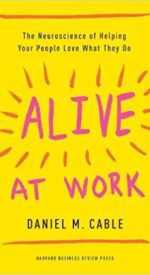
Alive at Work: The Neuroscience of Helping Your People Love What They Do
Poll after poll has confirmed that an astonishing number of workers are disengaged from their work. Why is this happening? And how can we fix the problem?
In this bold, enlightening book, social psychologist and professor Daniel M. Cable takes leaders into the minds of workers and reveals the surprising secret to restoring their zest for work.
Disengagement isn’t a motivational problem, it’s a biological one. Humans aren’t built for routine and repetition. We’re designed to crave exploration, experimentation, and learning–in fact, there’s a part of our brains, which scientists have coined “the seeking system,” that rewards us for taking part in these activities. But the way organizations are run prevents many of us from following our innate impulses. As a result, we shut down.
Things need to change. More than ever before, employee creativity and engagement are needed to win. Fortunately, it won’t take an extensive overhaul of your organizational culture to get started. With small nudges, you can personally help people reach their fullest potential.
Alive at Work reveals:
How to encourage people to bring their best selves to work and use their greatest strengths to help your organization flourish
How to build creative environments that motivate people to share ideas, work smarter, and embrace change
How to enhance people’s connection to their work and your customers
How to create personalized experiences that help people feel a deeper sense of purpose
Filled with fascinating stories from the author’s extensive research, Alive at Work is the inspirational guide that you need to tap into the passion, creativity, and purpose fizzing beneath the surface of every person who falls under your leadership.

The Common Good
From the best-selling author of Saving Capitalism and The Work of Nations, a passionate, clear-eyed manifesto on why we must restore the idea of the common good to the center of our economics and politics.
With the warmth and lucidity that have made him one of our most important public voices, Robert B. Reich makes the case for a generous, inclusive understanding of the American project, centering on the moral obligations of citizenship. Rooting his argument in everyday reality and common sense, Reich demonstrates the existence of a common good, and argues that it is this that defines a society or a nation. Societies and nations undergo virtuous cycles that reinforce and build the common good, as well as vicious cycles that undermine it. Over the course of the past five decades, Reich contends, America has been in a slowly accelerating vicious cycle–one that can and must be reversed. But first we need to weigh what really matters, and how we as a country should relate to honor, shame, patriotism, truth, and the meaning of leadership.
Powerful, urgent, and utterly vital, this is a heartfelt missive from one of our foremost political thinkers: a fundamental statement about the purpose of society and a cri de coeur to save America’s soul.

Girl, Stop Apologizing: A Shame-Free Plan for Embracing and Achieving Your Goals
“I believe we can change the world. But first, we’ve got to stop living in fear of being judged for who we are.”
Rachel Hollis has seen it too often: women not living into their full potential. They feel a tugging on their hearts for something more, but they’re afraid of embarrassment, of falling short of perfection, of not being enough.
In Girl, Stop Apologizing, #1 New York Times bestselling author and founder of a multimillion-dollar media company, Rachel Hollis sounds a wake-up call. She knows that many women have been taught to define themselves in light of other people—whether as wife, mother, daughter, or employee—instead of learning how to own who they are and what they want. With a challenge to women everywhere to stop talking themselves out of their dreams, Hollis identifies the excuses to let go of, the behaviors to adopt, and the skills to acquire on the path to growth, confidence, and believing in yourself.
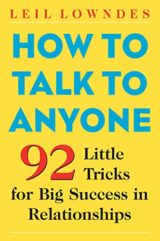
How to Talk to Anyone: 92 Little Tricks for Big Success in Relationships
“You’ll not only break the ice, you’ll melt it away with your new skills.” — Larry King
“The lost art of verbal communication may be revitalized by Leil Lowndes.” — Harvey McKay, author of “How to Swim with the Sharks Without Being Eaten Alive”
What is that magic quality makes some people instantly loved and respected? Everyone wants to be their friend (or, if single, their lover!) In business, they rise swiftly to the top of the corporate ladder. What is their “Midas touch?”
What it boils down to is a more skillful way of dealing with people.
The author has spent her career teaching people how to communicate for success. In her book How to Talk to Anyone (Contemporary Books, October 2003) Lowndes offers 92 easy and effective sure-fire success techniques– she takes the reader from first meeting all the way up to sophisticated techniques used by the big winners in life. In this information-packed book you’ll find:
9 ways to make a dynamite first impression
14 ways to master small talk, “big talk,” and body language
14 ways to walk and talk like a VIP or celebrity
6 ways to sound like an insider in any crowd
7 ways to establish deep subliminal rapport with anyone
9 ways to feed someone’s ego (and know when NOT to!)
11 ways to make your phone a powerful communications tool
15 ways to work a party like a politician works a room
7 ways to talk with tigers and not get eaten alive
In her trademark entertaining and straight-shooting style, Leil gives the techniques catchy names so you’ll remember them when you really need them, including: “Rubberneck the Room,” “Be a Copyclass,” “Come Hither Hands,” “Bare Their Hot Button,” “The Great Scorecard in the Sky,” and “Play the Tombstone Game,” for big success in your social life, romance, and business.
How to Talk to Anyone, which is an update of her popular book, Talking the Winner’s Way (see the 5-star reviews of the latter) is based on solid research about techniques that work!
By the way, don’t confuse How to Talk to Anyone with one of Leil’s previous books, How to Talk to Anybody About Anything. This one is completely different!

Behemoth: A History of the Factory and the Making of the Modern World
A sweeping, global history of the rise of the factory and its effects on society.
We live in a factory-made world: modern life is built on three centuries of advances in factory production, efficiency, and technology. But giant factories have also fueled our fears about the future since their beginnings, when William Blake called them “dark Satanic mills.” Many factories that operated over the last two centuries―such as Homestead, River Rouge, and Foxconn―were known for the labor exploitation and class warfare they engendered, not to mention the environmental devastation caused by factory production from the beginning of the Industrial Revolution up to today.
In a major work of scholarship that is also wonderfully accessible, celebrated historian Joshua B. Freeman tells the story of the factory and examines how it has reflected both our dreams and our nightmares of industrialization and social change. He whisks readers from the textile mills in England that powered the Industrial Revolution and the factory towns of New England to the colossal steel and car plants of twentieth-century America, Eastern Europe, and the Soviet Union and on to today’s behemoths making sneakers, toys, and cellphones in China and Vietnam.
The giant factory, Freeman shows, led a revolution that transformed human life and the environment. He traces arguments about factories and social progress through such critics and champions as Marx and Engels, Charles Dickens, Alexander Hamilton, Henry Ford, and Joseph Stalin. He chronicles protests against standard industry practices from unions and workers’ rights groups that led to shortened workdays, child labor laws, protection for organized labor, and much more.
In Behemoth, Freeman also explores how factories became objects of great wonder that both inspired and horrified artists and writers in their time. He examines representations of factories in the work of Charles Sheeler, Margaret Bourke-White, Charlie Chaplin, Diego Rivera, and Edward Burtynsky.
Behemoth tells the grand story of global industry from the Industrial Revolution to the present. It is a magisterial work on factories and the people whose labor made them run. And it offers a piercing perspective on how factories have shaped our societies and the challenges we face now.
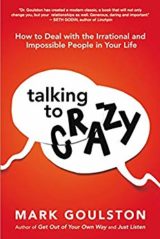
Talking to ‘Crazy’: How to Deal with the Irrational and Impossible People in Your Life
Let’s face it, we all know people who are irrational. No matter how hard you try to reason with them, it never works. So what’s the solution? How do you talk to someone who’s out of control? What can you do with a boss who bullies, a spouse who yells, or a friend who frequently bursts into tears?
In his book, Just Listen, Mark Goulston shared his bestselling formula for getting through to the resistant people in your life. Now, in his breakthrough new book Talking to Crazy, he brings his communication magic to the most difficult group of all—the downright irrational. As a psychiatrist, Goulston has seen his share of crazy and he knows from experience that you can’t simply argue it away. The key to handling irrational people is to learn to lean into the crazy—to empathize with it.
That radically changes the dynamic and transforms you from a threat into an ally. Talking to Crazy explains this counterintuitive Sanity Cycle and reveals: Why people act the way they do
• How instinctive responses can exacerbate the situation—and what to do instead
• When to confront a problem and when to walk away
• How to use a range of proven techniques including Time Travel, the Fish-bowl, and the Belly Roll
• And much more You can’t reason with unreasonable people—but you can reach them. This powerful and practical book shows you how.
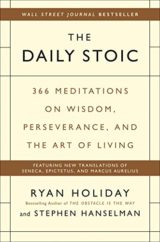
The Daily Stoic: 366 Meditations on Wisdom, Perseverance, and the Art of Living
From the team that brought you The Obstacle Is the Way and Ego Is the Enemy, a beautiful daily devotional of Stoic meditations—an instant Wall Street Journal and USA Today Bestseller.
Why have history’s greatest minds—from George Washington to Frederick the Great to Ralph Waldo Emerson, along with today’s top performers from Super Bowl-winning football coaches to CEOs and celebrities—embraced the wisdom of the ancient Stoics? Because they realize that the most valuable wisdom is timeless and that philosophy is for living a better life, not a classroom exercise.
The Daily Stoic offers 366 days of Stoic insights and exercises, featuring all-new translations from the Emperor Marcus Aurelius, the playwright Seneca, or slave-turned-philosopher Epictetus, as well as lesser-known luminaries like Zeno, Cleanthes, and Musonius Rufus. Every day of the year you’ll find one of their pithy, powerful quotations, as well as historical anecdotes, provocative commentary, and a helpful glossary of Greek terms.
By following these teachings over the course of a year (and, indeed, for years to come) you’ll find the serenity, self-knowledge, and resilience you need to live well.
From the Hardcover edition.

Girl, Stop Apologizing: A Shame-Free Plan for Embracing and Achieving Your Goals
“I believe we can change the world. But first, we’ve got to stop living in fear of being judged for who we are.”
Rachel Hollis has seen it too often: women not living into their full potential. They feel a tugging on their hearts for something more, but they’re afraid of embarrassment, of falling short of perfection, of not being enough.
In Girl, Stop Apologizing, #1 New York Times bestselling author and founder of a multimillion-dollar media company, Rachel Hollis sounds a wake-up call. She knows that many women have been taught to define themselves in light of other people—whether as wife, mother, daughter, or employee—instead of learning how to own who they are and what they want. With a challenge to women everywhere to stop talking themselves out of their dreams, Hollis identifies the excuses to let go of, the behaviors to adopt, and the skills to acquire on the path to growth, confidence, and believing in yourself.

Rich Dad Poor Dad: What the Rich Teach Their Kids About Money That the Poor and Middle Class Do Not!
Rich Dad Poor Dad is Robert’s story of growing up with two dads — his real father and the father of his best friend, his rich dad — and the ways in which both men shaped his thoughts about money and investing. The book explodes the myth that you need to earn a high income to be rich and explains the difference between working for money and having your money work for you.
20 Years… 20/20 Hindsight
In many ways, the messages of Rich Dad Poor Dad, messages that were criticized and challenged two decades ago, are more meaningful, relevant and important today than they were 20 years ago.
As always, readers can expect that Robert will be candid, insightful… and continue to rock more than a few boats in his retrospective.
Will there be a few surprises? Count on it.
• Explodes the myth that you need to earn a high income to become rich
• Challenges the belief that your house is an asset
• Shows parents why they can’t rely on the school system to teach their kids about money
• Defines once and for all an asset and a liability
• Teaches you what to teach your kids about money for their future financial success

We the Corporations: How American Businesses Won Their Civil Rights
Longlisted for the 2018 National Book Award for Nonfiction
We the Corporations chronicles the revelatory story of one of the most successful, yet least known, “civil rights movements” in American history.
We the Corporations chronicles the astonishing story of one of the most successful yet least well-known “civil rights movements” in American history. Hardly oppressed like women and minorities, business corporations, too, have fought since the nation’s earliest days to gain equal rights under the Constitution―and today have nearly all the same rights as ordinary people.
Exposing the historical origins of Citizens United and Hobby Lobby, Adam Winkler explains how those controversial Supreme Court decisions extending free speech and religious liberty to corporations were the capstone of a centuries-long struggle over corporate personhood and constitutional protections for business. Beginning his account in the colonial era, Winkler reveals the profound influence corporations had on the birth of democracy and on the shape of the Constitution itself. Once the Constitution was ratified, corporations quickly sought to gain the rights it guaranteed. The first Supreme Court case on the rights of corporations was decided in 1809, a half-century before the first comparable cases on the rights of African Americans or women. Ever since, corporations have waged a persistent and remarkably fruitful campaign to win an ever-greater share of individual rights.
Although corporations never marched on Washington, they employed many of the same strategies of more familiar civil rights struggles: civil disobedience, test cases, and novel legal claims made in a purposeful effort to reshape the law. Indeed, corporations have often been unheralded innovators in constitutional law, and several of the individual rights Americans hold most dear were first secured in lawsuits brought by businesses.
Winkler enlivens his narrative with a flair for storytelling and a colorful cast of characters: among others, Daniel Webster, America’s greatest advocate, who argued some of the earliest corporate rights cases on behalf of his business clients; Roger Taney, the reviled Chief Justice, who surprisingly fought to limit protections for corporations―in part to protect slavery; and Roscoe Conkling, a renowned politician who deceived the Supreme Court in a brazen effort to win for corporations the rights added to the Constitution for the freed slaves. Alexander Hamilton, Teddy Roosevelt, Huey Long, Ralph Nader, Louis Brandeis, and even Thurgood Marshall all played starring roles in the story of the corporate rights movement.
In this heated political age, nothing can be timelier than Winkler’s tour de force, which shows how America’s most powerful corporations won our most fundamental rights and turned the Constitution into a weapon to impede the regulation of big business.

Office 365 For Dummies (3rd Edition)
Everything you need to get productive in the Cloud with Office 365
With 70 million users worldwide, Microsoft Office 365 combines the familiar Office desktop suite with cloud-based versions of Microsoft’s next-generation communications and collaboration services. It offers many benefits including security, reliability, compatibility with other products, over-the-air updates in the cloud that don’t require anything from the user, single sign on for access to everything right away, and so much more.
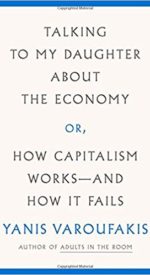
Talking to My Daughter About the Economy: or, How Capitalism Works–and How It Fails
In Talking to My Daughter About the Economy, activist Yanis Varoufakis, Greece’s former finance minister and the author of the international bestseller Adults in the Room, pens a series of letters to his young daughter, educating her about the business, politics, and corruption of world economics.
Yanis Varoufakis has appeared before heads of nations, assemblies of experts, and countless students around the world. Now, he faces his most important―and difficult―audience yet. Using clear language and vivid examples, Varoufakis offers a series of letters to his young daughter about the economy: how it operates, where it came from, how it benefits some while impoverishing others. Taking bankers and politicians to task, he explains the historical origins of inequality among and within nations, questions the pervasive notion that everything has its price, and shows why economic instability is a chronic risk. Finally, he discusses the inability of market-driven policies to address the rapidly declining health of the planet his daughter’s generation stands to inherit.
Throughout, Varoufakis wears his expertise lightly. He writes as a parent whose aim is to instruct his daughter on the fundamental questions of our age―and through that knowledge, to equip her against the failures and obfuscations of our current system and point the way toward a more democratic alternative.
